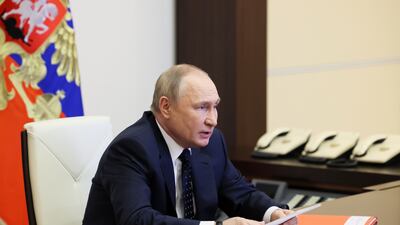Live updates: follow the latest news on Russia-Ukraine
Russian President Vladimir Putin on Saturday increased pressure on the West to lift sanctions in exchange for unblocking food exports, a move regarded by Ukraine as blackmail.
Mr Putin told the leaders of France and Germany in a phone call that Russia was “ready to help” in tackling an emerging food crisis, the Kremlin said, but that releasing its own food stocks “will require the lifting of the relevant sanctions”.
French President Emmanuel Macron and German Chancellor Olaf Scholz said they had secured a promise that Russia would not exploit a gap in Ukraine's naval defences if mines are cleared to free up shipping lanes.
But Mr Putin said the barrage of international sanctions on Russia was to blame for shortages of food, a narrative rejected by European leaders who say the hunger crisis is of Moscow's making.
Mr Scholz's spokesman said the three leaders had agreed in the 80-minute call that any accord on food shipments should be reached via the United Nations.
Ukraine's Foreign Minister Dmytro Kuleba told the World Economic Forum in Davos this week that “you could not find a better example of blackmail” than Russia's positioning on the food crisis.
Mr Putin said peace negotiations were “frozen due to the fault of Kyiv,” according to the Kremlin readout, but that Russia was ready for dialogue and to look at ways to unblock Ukraine's ports.
Peace talks have stalled since the discovery of civilian dead near Ukraine's capital in April.
The Russian leader has pressed his demand for sanctions relief in calls this week with Italian Prime Minister Mario Draghi and Austrian Chancellor Karl Nehammer, opening another front in his tentative diplomacy with western leaders.

Mr Scholz and Mr Macron, who both visited Moscow in the weeks before the war in doomed attempts to stop an invasion, urged Russia to take up “serious direct negotiations with the Ukrainian president”, Volodymyr Zelenskyy, and pursue a diplomatic solution to the crisis.
"Any solution to the war has to be negotiated between Moscow and Kyiv, respecting Ukraine's sovereignty and territorial integrity," said Mr Macron after the talks.
The French president's office said Mr Putin had been urged to release 2,500 troops who defended the Azovstal steelworks in Mariupol and have been taken prisoner Russian forces.
Mr Putin told the two western leaders the increasing supply of western weapons to Ukraine created risks of “further destabilisation … and aggravation of the humanitarian crisis”.
UN agencies have spoken of alarming food insecurity resulting from the war between two of the world's main agricultural exporters.
The World Food Programme said it is rationing supplies to displaced people, and the European Union blames the crisis for runaway bread prices in Lebanon.
The EU accuses Russia of orchestrating the food shortages by bombarding grain stores and blocking exports from Ukraine's Black Sea ports during the war.
Mr Putin described Russian forces as strictly observing international law, a claim rejected by many western governments and observers who claim Moscow's troops may be guilty of war crimes.


